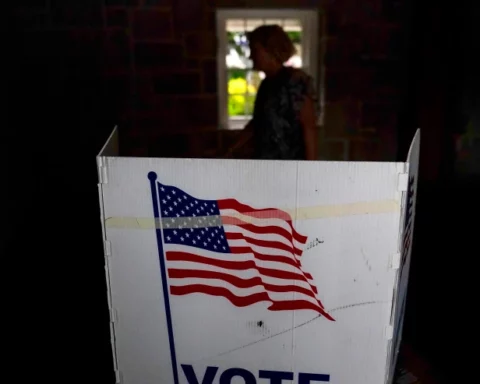TBILISI — Early results show Georgia’s ruling party leading hotly contested local elections amid high tensions, allegations of electoral fraud, and early claims of victory by the South Caucasus country’s two main political forces.
With more than 90 percent of the votes tallied, the ruling Georgian Dream party had nearly 47.2 percent of the vote, according to the Central Election Commission on October 3.
The main opposition party, the United National Movement (ENM), had 30.6 percent of the vote. The rest of the vote was split among the remaining 48 parties, with the For Georgia party third at nearly 7.7 percent.
The nationwide elections, which also included mayoral and local-council races, were held on October 2 in a highly polarized atmosphere and were seen as a referendum on Georgian Dream’s rule.
The opposition was seeking to use the elections as leverage to demand early parliamentary elections if Georgian Dream failed to get more than 43 percent of the national vote.
Tensions were heightened with the arrest of former President and ENM founder Mikheil Saakashvili within hours of his return from self-exile to rally the opposition ahead of the vote. He was expected to be charged on October 3 with crossing the border illegally.
In the capital, Tbilisi, the race appeared headed for a runoff with nearly 58 percent of the votes counted.
With the results of nearly 47 percent of precincts in, incumbent Mayor Kakha Kaladze of Georgian Dream had 45.3 percent of the vote, while ENM party chief Nika Melia was at 34.2 percent.
A runoff is required if no candidate gets more than 50 percent of the vote
Georgian Dream supporters gathered outside party headquarters on a central Tbilisi square after polls closed on October 2, with Prime Minister Irakli Gharibashvili congratulating them for their “great victory.”
“Today, we finished polarization in the country, the era of hate and lies,” he said, referring to the opposition.
Meanwhile, Melia said Georgian Dream had “completely lost the capital.”
“They lost the political center,” he insisted, adding that the opposition will hold the majority of seats in the Tbilisi city council.
Hours earlier, the opposition leader accused the ruling party of “voter intimidation and vote-buying,” and urged Georgians to “be mobilized so that Georgian Dream can’t manipulate election results.”
Nongovernmental organizations monitoring the elections reported dozens of suspected cases of electoral fraud, including vote-buying, violations of the secrecy of the ballot, and “carousel voting” — where voters are bussed into multiple polling stations as an organized group.
According to the Central Election Commission, 366 complaints were filed with the district election commissions during election day, most of them being “procedural deficiencies [that will] require disciplinary action against commission members.”
An independent union of journalists, the Georgian Charter of Journalistic Ethics, reported cases where journalists were cursed, threatened, or physically assaulted at polling stations.
Voters cast ballots for mayors in 64 municipalities, as well as nearly 2,100 members of local self-governing councils. Voter turnout nationally stood at nearly 52 percent, according to election authorities.
The local elections come as the country has been in a protracted political crisis since Georgian Dream won parliamentary elections a year ago. Opposition parties claimed the vote was unfair and fraudulent, while international observers said it had been competitive and that fundamental freedoms were generally respected.
Under an EU-brokered agreement reached in April to defuse the paralyzing political crisis between Georgian Dream and opposition parties, early parliamentary elections were to be called in 2022 if Georgian Dream received less than 43 percent in local elections.
But in July, Georgian Dream leader Irakli Kobakhidze annulled the so-called April 19 agreement, blaming the opposition for its failure and claiming most other key provisions had been met.
At the time, Kobakhidze said that smaller opposition parties signed the agreement, but the larger “radical opposition” blocs including the main opposition ENM refused to join the deal.
Observers say the election and its aftermath could usher in a period of instability in the country with aspirations of joining Western institutions
“Today’s vote is probably a culmination of the months-long political crisis that has a good chance to drive Georgia into more instability and less prospects for development,” Olesya Vartanyan, a senior analyst with the International Crisis Group, told RFE/RL.

“[It’s] difficult to say if the ruling party will even want to demonstrate its readiness for compromise after it withdrew from the April 19 agreement that included a step-by-step plan on how to start getting out of Georgia’s stagnation and regular crisis situations. Many in the opposition are also very frustrated with the lack of results,” she said.
The arrest of Saakashvili, who ruled Georgia from 2004 to 2013, added extra fuel to the country’s political crises.
The former president left the country shortly after his term ended, and in 2015 he gave up his Georgian citizenship to become governor of Ukraine’s Odesa region, although he continues to be considered a leading opposition figure in Georgia.
Saakashvili was convicted in absentia on corruption and abuse of power charges in 2018 that says are politically motivated. He faces a total of nine years in prison after being found guilty of abusing his authority in two separate cases: one related to trying to cover up evidence related to the 2005 beating of an opposition lawmaker, and another relating to the killing of a Georgian banker.





